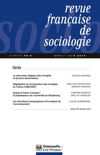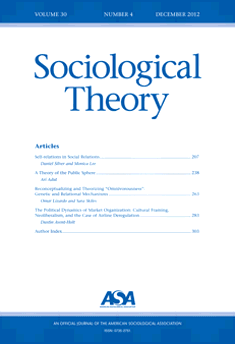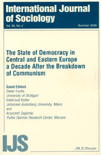
Journal of Classical Sociology
Scope & Guideline
Cultivating a Rich Dialogue on Sociological Heritage
Introduction
Aims and Scopes
- Exploration of Classical Sociological Theories:
The journal focuses on the foundational theories established by classical sociologists like Durkheim, Weber, Simmel, and Marx, analyzing their contributions and relevance in contemporary sociological discourse. - Interdisciplinary Approaches:
It encourages interdisciplinary research that connects sociology with other fields such as political science, philosophy, and cultural studies, thereby enriching sociological analysis and broadening its application. - Critical Engagement with Modernity:
The journal critically examines the implications of modernity, capitalism, and globalization on social structures and individual agency, drawing on classical theories to understand current social phenomena. - Historical Contextualization:
There is a consistent emphasis on situating sociological theories within their historical contexts, exploring how past social conditions shape theoretical developments and contemporary interpretations. - Methodological Innovations:
The journal promotes innovative methodologies in sociological research, encouraging scholars to revisit and adapt classical methods for new inquiries into social phenomena.
Trending and Emerging
- Postcolonial and Decolonial Perspectives:
There is an increasing focus on postcolonial and decolonial theories, examining how classical sociology can be reinterpreted in the context of colonial histories and their ongoing impacts on contemporary societies. - Intersectionality and Diversity:
Emerging themes related to intersectionality and the diverse experiences of marginalized groups are gaining traction, reflecting a broader commitment to inclusivity within sociological discourse. - Environmental Sociology:
The journal is beginning to incorporate themes of environmental sociology, exploring the intersections of classical thought with contemporary ecological crises and sustainability concerns. - Critical Theory and Contemporary Challenges:
There is a growing interest in critical theory as a lens for understanding contemporary societal challenges, such as inequality, political extremism, and the impacts of technology on social relations. - Reflections on Modernity and Technology:
Recent publications increasingly reflect on the implications of modernity and technology within classical frameworks, addressing how contemporary social dynamics are reshaped by digitalization and globalization.
Declining or Waning
- Classical Economic Theories:
There is a noticeable decrease in papers directly addressing classical economic theories, such as those of Veblen and Marshall, as the journal shifts focus towards more contemporary critiques of capitalism and neoliberalism. - Eurocentric Perspectives:
The journal has gradually moved away from exclusively Eurocentric analyses, as evidenced by a growing number of articles that engage with non-Western sociological traditions and postcolonial critiques, indicating a diminishing focus on Eurocentrism. - Strict Canonical Interpretations:
The emphasis on strictly canonical interpretations of classical texts is waning, with a trend towards critical re-readings and applications of classical theories to contemporary issues, suggesting a shift towards more dynamic and flexible understandings. - Traditional Methodologies:
Traditional methodologies associated with classical sociology, such as purely qualitative or historical analyses, are becoming less common as the journal embraces more diverse and innovative methodological approaches.
Similar Journals

REVUE FRANCAISE DE SOCIOLOGIE
Exploring the Dynamics of Society and PoliticsREVUE FRANCAISE DE SOCIOLOGIE, published by PRESSES SCIENCES PO, is a prominent journal dedicated to the fields of sociology and political science, characterized by its rich historical contributions since its inception in 1977. With a commitment to scholarly excellence, the journal currently holds a Q3 ranking in its category for 2023, illustrating its relevance within the academic community. This esteemed publication offers a platform for innovative research and critical discourse, catering to both established scholars and emerging voices in the social sciences. The journal seeks to explore contemporary sociological issues through rigorous empirical analysis and theoretical reflection, fostering a deeper understanding of socio-political dynamics. Although it does not offer Open Access options, REVUE FRANCAISE DE SOCIOLOGIE remains a vital resource for researchers and students alike, providing access to cutting-edge scholarship that shapes the conversation around societal structures and political frameworks.

Digithum
Innovative Perspectives on Today's Challenges.Digithum is an esteemed open access journal published by Universitat Oberta de Catalunya since 1999, dedicated to fostering interdisciplinary discourse within the realms of Arts and Humanities as well as Social Sciences. With an ISSN of 1575-2275, this journal provides a platform that bridges academic inquiry and contemporary societal issues, earning recognition with a Q3 ranking in Arts and Humanities and a Q4 ranking in Social Sciences as of 2023. Based in Barcelona, Spain, Digithum is indexed in key databases and holds a prestigious position in Scopus rankings, particularly noted for its impact in the arts and humanities with a 76th percentile standing. The journal promotes unrestricted access to its articles, ensuring that valuable research reaches a broad audience, thus empowering scholars, practitioners, and students to engage deeply with the challenges and narratives of our time. With the evolving landscape of academic research, Digithum remains a vital resource for those seeking to explore the intersections of culture, technology, and society.

SOCIOLOGICAL THEORY
Fostering debate and dialogue in the realm of sociological theory.Sociological Theory, published by SAGE Publications Inc, is a premier journal dedicated to advancing the field of sociology through innovative theoretical approaches and empirical research. With an impressive impact factor and recognized as a Q1 journal in both Sociology and Political Science, it ranks 86 out of 1466 in its category, placing it in the 94th percentile according to Scopus metrics. This journal seeks to foster rigorous debate and insight on contemporary sociological issues, welcoming contributions that challenge existing paradigms and offer new perspectives. Founded in 1996, Sociological Theory continues to push the boundaries of sociological inquiry through its commitment to quality and relevance, making it an essential resource for researchers, professionals, and students alike. Based in the United Kingdom, this journal is not an open-access publication, but it remains widely accessible through institutional subscriptions, ensuring that its valuable content reaches a global audience interested in the dynamics of social life.

BERLINER JOURNAL FUR SOZIOLOGIE
Uncovering the dynamics of society with every publication.The BERLINER JOURNAL FUR SOZIOLOGIE, published by VS VERLAG SOZIALWISSENSCHAFTEN-GWV FACHVERLAGE GMBH, stands as a significant contribution to the fields of Sociology and Political Science, with a commendable Scopus rank of 575 out of 1466, placing it within the top 60th percentile of journals in its category. Established in Germany, this journal has been a vital platform for scholarly discourse since its inception in 1992, transitioning through various publishing phases and demonstrating a robust commitment to advancing sociological inquiry. The journal's impact is underscored by its current Q3 quartile classification, reflecting its relevance and authority within the academic community. Although not open access, the BERLINER JOURNAL FUR SOZIOLOGIE ensures that readers and researchers can access a wealth of innovative research that informs social theories and practices, making it an essential resource for those engaged in understanding complex social dynamics. The journal continues to welcome submissions that push the boundaries of sociological thought and promote interdisciplinary approaches to contemporary issues.

Interpretation-A Journal of Political Philosophy
Engaging Minds, Transforming Political TheoryInterpretation - A Journal of Political Philosophy, published by INTERPRETATION, INC, serves as a pivotal forum for scholars and practitioners alike to explore the nuanced intersections of philosophy and political theory. This esteemed journal, bearing the ISSN 0020-9635, has been instrumental in advancing discourse in the field, particularly during its coverage from 2002 to 2018. Although access options remain conventional, the journal's robust contributions to arts and humanities, alongside its insightful pieces in sociology and political science, ensure its relevance despite the discontinuation of indexing in Scopus. With its ranking within the lower percentiles in both philosophy and political science, Interpretation continues to challenge emerging thinkers to critically engage with fundamental political questions. It stands as a significant resource for researchers, professionals, and students dedicated to enriching their understanding of the philosophical underpinnings that shape political discourse.

Chinese Journal of Sociology
Unveiling the Complexities of Society Through Rigorous Research.The Chinese Journal of Sociology, published by SAGE Publications Ltd, is a leading venue for research in the field of sociology, with a focus on contemporary social issues within and beyond China. Since its establishment in 2015, the journal has gained a reputation for its rigorous peer-reviewed articles, contributing significantly to scholarly discourse and understanding of social dynamics in a rapidly changing world. With an impressive Q2 category ranking in Social Sciences and a solid Scopus rank of #111 out of 275, it serves as an essential resource for researchers, professionals, and students keen to explore the complexities of social structures and behaviors. Although not an open access journal, it offers access to a wealth of knowledge and insights, underlining its importance in the academic community. Located in the United Kingdom, the journal strives to foster interdisciplinary collaborations and highlight diverse perspectives, making it an invaluable platform for social science scholarship dedicated to advancing our understanding of the societal landscape.

International Journal of Sociology
Connecting Research and Society through SociologyInternational Journal of Sociology, published by Routledge Journals, Taylor & Francis Ltd, stands as a premier platform for innovative sociological research and discourse. With an impressive Q1 ranking in Social Sciences (miscellaneous) for 2023 and a significant Scopus rank of #54 out of 275, this journal promotes high-quality scholarship that informs and shapes contemporary sociological thought. The journal caters to a diverse readership, including researchers, professionals, and students, by disseminating rigorous empirical studies, theoretical advancements, and critical reviews that dive deep into the complexities of social behavior and structure. While the journal operates under a traditional access model, its commitment to fostering knowledge in the field is evident as it converges various aspects of sociology from 2019 to 2024. Engaging with articles from the International Journal of Sociology not only enriches understanding but also contributes to meaningful societal change.

Sociology Compass
Connecting Theory and Practice in SociologySociology Compass is a premier journal published by WILEY that serves as a leading platform for scholars in the enlightening field of sociology. With an impact factor that reflects its high standards and rigorous peer-review process, the journal is categorized in the Q1 quartile within the social sciences, placing it in the top tier of journals in its field. Designated under the Scopus ranking system as position #48 out of 275, it remains in the 82nd percentile, underscoring its significant contribution to the academic community. Sociology Compass accepts a diverse range of contributions, aiming to provide insightful analysis and comprehensive coverage of contemporary sociological topics, making it an essential resource for researchers, professionals, and students alike. The journal envisions to foster critical engagement and facilitate a deeper understanding of social dynamics through its innovative articles and reviews from 2011 to 2024, promoting an accessible yet academic discourse that can impact both theory and practice in sociology.

Sociologija
Advancing the Frontiers of SociologySociologija is a pioneering, peer-reviewed journal published by the University of Belgrade, Faculty of Philosophy, dedicated to advancing the field of sociology and related social sciences. Since its transition to Open Access in 2002, the journal has made significant strides in disseminating vital research and fostering academic discourse within and beyond its Serbian context. As of 2023, it is classified in the Q3 quartile of the Social Sciences category, reflecting its contributions to the academic community, with a Scopus ranking of #188 out of 275 in General Social Sciences. The journal spans a convergence period from 2007 to 2024, inviting submissions that engage with contemporary sociological theories and issues. Sociologija’s commitment to open accessibility ensures that critical research reaches a broader audience, supporting scholars, practitioners, and students in their quest for knowledge and understanding of social phenomena. With its headquarters in Belgrade, Serbia, the journal serves as a significant platform for regional and international scholarship, and plays a crucial role in the global discourse on social science.

Annual Review of Sociology
Fostering Critical Analyses in SociologyAnnual Review of Sociology, published by Annual Reviews, is a premier academic journal that plays a critical role in advancing the field of sociology. Established as a leading publication since its inception in 1975, the journal brings together the highest quality scholarly reviews, summarizing key developments and trends within the discipline. With a notable Q1 ranking in both Sociology and Political Science and a remarkable 99th percentile Scopus rank among over 1400 journals, it consistently showcases cutting-edge research and invites contributions from preeminent scholars. The journal's rigorous review process ensures that articles provide comprehensive insights and critical analyses, making it an essential resource for researchers, professionals, and students alike. Although it is not an open-access publication, its influential content is crucial for anyone looking to deepen their understanding of social structures, relationships, and dynamics. Located in the heart of Palo Alto, California, the Annual Review of Sociology continues to be a cornerstone in the academic fabric of the social sciences.